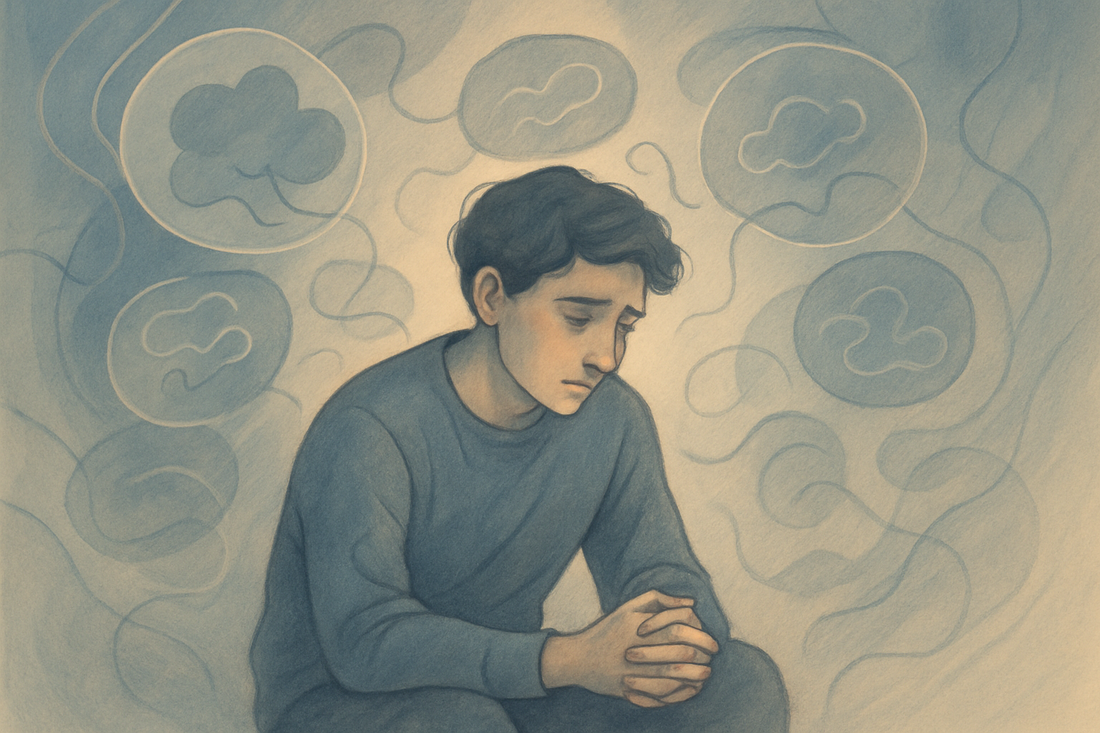
Driven But Drained: The Hidden Side of Anxiety Through Ayurveda and the Nervous System
We often celebrate being “driven”—the ability to show up, achieve, and hold everything together. But beneath the polished surface, many people live with a quieter truth: they are drained inside. This is the hidden side of anxiety, where external competence masks internal distress.
The Modern Face of Anxiety: High-Functioning, Yet Exhausted
High-functioning anxiety looks different from what most imagine. It’s not panic attacks or visible breakdowns. Instead, it’s the professional who never misses a deadline, the caregiver who never says no, the friend who’s always “fine.”
On the inside, however, there may be:
· Constant restlessness or racing thoughts
· Difficulty sleeping
· Reliance on structure or control to stay afloat
· A sense of running on empty, despite achievements
Modern neuroscience helps explain this. Anxiety keeps the sympathetic nervous system—our “fight or flight” mode—switched on. Over time, the stress hormones cortisol and adrenaline wear down energy reserves, disrupt digestion, and weaken immunity.
The Ayurvedic Lens: When Vata Runs High
Ayurveda describes this pattern beautifully through the lens of Vata dosha. Vata, governed by air and space, drives movement, quickness, and creativity. But when it is imbalanced, it creates instability, fear, dryness, and exhaustion.
Signs of high Vata (and often hidden anxiety) include:
· Insomnia or light, restless sleep
· Dry skin, bloating, or irregular digestion
· Racing thoughts and difficulty grounding
· Feeling “wired but tired”
In essence, a Vata imbalance mirrors what modern medicine calls nervous system overdrive.
Healing: Regulating the Nervous System Through Ayurveda
The path forward is not about eliminating drive but about restoring balance—moving from being driven but drained to driven and resilient.
Ayurvedic Practices to Rebalance
1. Grounding Daily Rituals
o Abhyanga (warm oil massage) with sesame or ashwagandha oil calms the nervous system and nourishes the skin.
o Consistency in meals and sleep stabilizes Vata and signals safety to the body.
2. Nourishing Foods
o Favor warm, cooked meals with healthy oils and spices like cumin, ginger, and cardamom.
o Reduce stimulants like coffee, which spike Vata and the sympathetic system.
3. Breath & Mind Practices
o Slow breathing (such as alternate nostril breathing) activates the parasympathetic nervous system.
o Gentle yoga and meditation ground both body and mind.
4. Botanical Support
o Herbs like ashwagandha, brahmi, and jatamansi have been shown to support resilience, reduce cortisol, and calm the nervous system.
The Science and Ayurveda Connection
· Neuroscience confirms that rituals like breathwork and mindfulness improve heart rate variability, a marker of nervous system balance.
· Adaptogens like ashwagandha are now studied for their ability to reduce stress hormone levels.
· Ayurveda, centuries ago, described the same truth: balance comes from grounding and nourishing practices that calm the flow of Vata.
Final Reflection
Being driven is not the problem. The problem is when drive comes at the cost of depletion. Ayurveda and modern neuroscience together show us that resilience is not about pushing harder, but about finding rhythm and nourishment—inside and out.
At Surrasa, we believe in this integrative path: helping you reconnect to balance through practices, herbs, and rituals rooted in both science and tradition.
Disclaimer: This blog is for educational purposes and not a substitute for professional medical advice.
References:
· Bandealy SS, Sheth NC, Matuella SK, Chaikind JR, Oliva IA, Philip SR, Jones PM, Hoge EA. Mind-Body Interventions for Anxiety Disorders: A Review of the Evidence Base for Mental Health Practitioners. Focus (Am Psychiatr Publ). 2021 Jun;19(2):173-183. doi: 10.1176/appi.focus.20200042. Epub 2021 Jun 17. PMID: 34690580; PMCID: PMC8475909..
· Pascoe MC, Thompson DR, Ski CF. Yoga, mindfulness-based stress reduction and stress-related physiological measures: A meta-analysis. Psychoneuroendocrinology. 2017 Dec;86:152-168. doi: 10.1016/j.psyneuen.2017.08.008. Epub 2017 Aug 30. PMID: 28963884.
· Szuhany KL, Simon NM. Anxiety Disorders: A Review. JAMA. 2022 Dec 27;328(24):2431-2445. doi: 10.1001/jama.2022.22744. PMID: 36573969.
